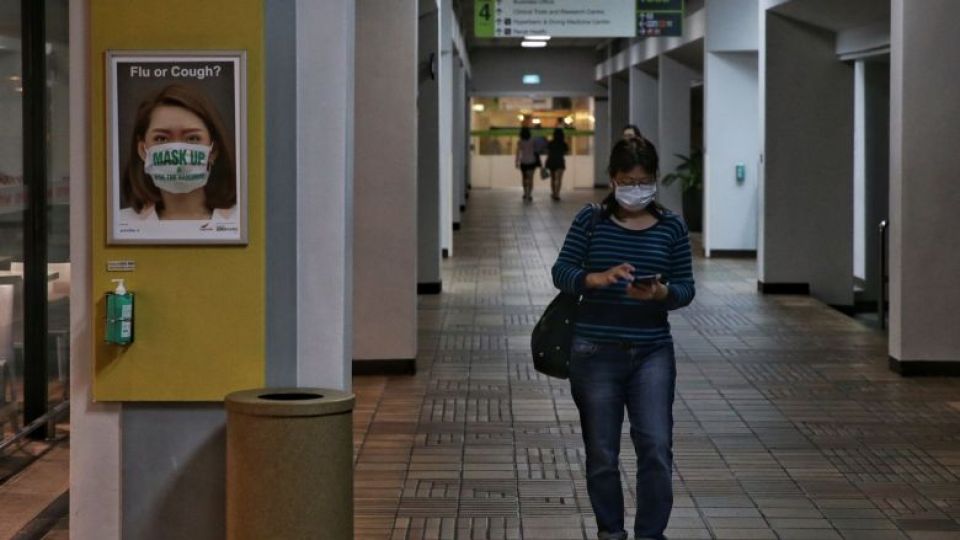February 14, 2020
The last new case is a 30-year-old Singaporean man who is a family member of case 50, the 62-year-old male DBS Bank employee who was confirmed to have the virus on Wednesday.
Eight more cases of the coronavirus with links to previous ones have been confirmed in Singapore, bringing the total number of infected people to 58.
Five of the new cases are linked to the Grace Assembly of God church, including a 54-year-old man who is a professor, from the National University of Singapore’s (NUS) School of Design and Environment (SDE).
The Ministry of Health said on Thursday (Feb 13) that the professor did not interact with colleagues and students after he fell ill.
The cluster is now linked to seven confirmed cases, including the church’s senior pastor Wilson Teo. Two earlier cases, both staff at the church, were announced on Wednesday.
Another two new cases are Bangladeshi work pass holders, aged 30 and 37, who are linked to a worksite in Seletar Aerospace Heights. They are cases 52 and 56.
The worksite is now linked to a cluster of four cases, all of whom are Bangladeshi nationals.
The last new case is a 30-year-old Singaporean man who is a family member of case 50, the 62-year-old male DBS Bank employee who was confirmed to have the virus on Wednesday. He is case 55.
None of the new cases has recent travel history to China. They are all currently warded in isolation rooms at the National Centre for Infectious Diseases.
Of the five linked to the Grace Assembly of God church, two were confirmed to have the virus on Wednesday afternoon, and the other three tested positive on Thursday morning. All five are Singaporeans.
They include four men, aged 26, 48, 54 and 55, and one 54-year-old woman.
Case 51, the 48-year-old man, fell ill on Feb 4 and saw a GP on Feb 5 and 10. He went to the NCID on Feb 11.
Before being hospitalised, he went to work at both of the church’s locations, in Tanglin Road and Bukit Batok West.
In a statement to the church’s congregants, the man identified himself as Mr Wilson Teo, a senior pastor.
He noted that he is recovering well and that all staff members of the church have been issued home quarantine orders by the MOH.
Both the church’s premises at Tanglin and Bukit Batok will be closed from Feb 14 to Feb 25 and reopen on Feb 26 pending further updates, he said.
Case 53, the 54-year-old NUS professor, fell ill on Feb 10 and went to the NCID on Feb 12. He tested positive the same day.
In a message to NUS staff and students, the university’s president Tan Eng Chye said the professor, who attends the Grace Assembly of God church, is in stable condition and in good spirits.
His last contact with students was on Feb 5, said Prof Tan.
As a precaution, e-learning will be conducted for all students at the SDE from Friday, Prof Tan added. There will be no in-person classes, tests, meetings or other interactions between students and staff of the school until Feb 21.
The week after, from Feb 22 to Mar 1, is a break period, or recess week.
It is unclear if the other three cases linked to the church – cases 54, 57 and 58 – are congregants or workers. Two previous cases in the cluster, cases 48 and 49, were both church workers who visited both locations.
One of the Bangladeshis confirmed to be infected on Thursday, case 52, fell ill on Feb 7.
He reported that he had mostly stayed in his rental apartment in Campbell Lane since he fell sick.
The 37-year-old was identified as a close contact of the two previously identified Bangladeshi work pass holders, who both worked at the Seletar Aerospaces Heights worksite.
The MOH also said on Thursday that Singapore will continue to rely on laboratory tests to confirm cases of infection.
It added that it would not change its approach to confirming cases of the virus despite the Chinese authorities adopting new broader guidelines, including the use of CT scans and clinical diagnosis of symptoms.
New diagnostic guidelines for confirming cases in China kicked in on Wednesday, allowing doctors to assess patients clinically and diagnose cases.
This means a patient can be confirmed to be suffering from Covid-19, as the disease is called, if they have symptoms of severe respiratory tract disease and a CT scan shows lesions in their lungs.
Previously, cases would only be confirmed after laboratory tests.
The number of confirmed cases in China’s Hubei province spiked after the new guidelines were adopted.
The death toll in Hubei also rose by 242 to 1,310 as of Wednesday after figures were revised to include cases that have not been lab-confirmed.


